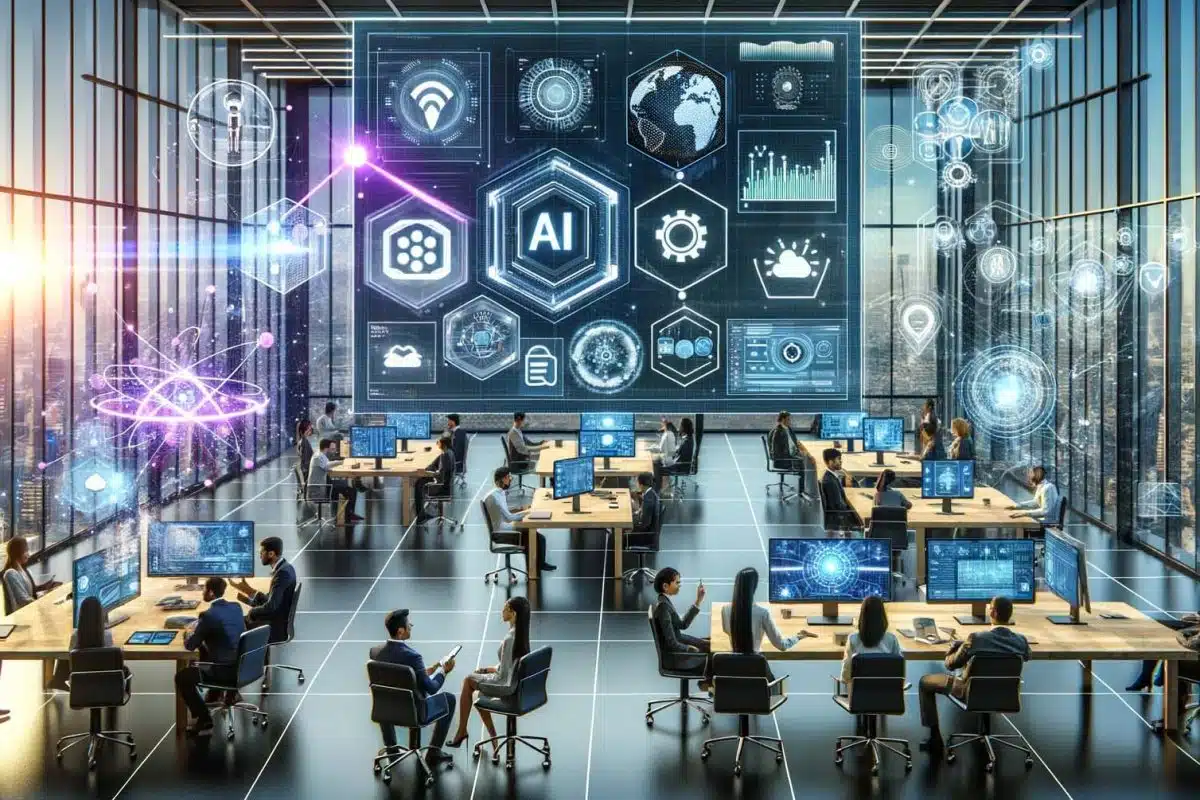The transformation of the workplace due to technological advancements is occurring at an extraordinary rate. This evolution encompasses a wide range of innovations, including artificial intelligence, web3, the metaverse, and the hybrid work model, which are revolutionizing the ways in which we communicate, collaborate, create, and innovate.
Let’s delve into the key technological trends that are redefining the nature of work in 2024 and beyond:
1. Artificial Intelligence (AI) and Generative AI:
Far from being mere buzzwords, these technologies are revolutionizing workplaces by automating routine tasks, thereby freeing up human resources for more innovative and strategic activities. While AI is not new, recent developments in computing power, data availability, and algorithms have significantly enhanced its capabilities. AI now plays a role in various workplace functions like data analysis, customer service, image generation, and product design. However, AI also presents challenges such as ethical concerns, social implications, and the potential displacement of jobs, making it vital to adopt responsible, human-centered AI practices and prepare the workforce for these changes.
2. Remote Collaboration Tools:
The advent of sophisticated collaboration tools, including video conferencing, project management software, and cloud-based document sharing, has facilitated the growth of remote work. These technologies enable efficient, real-time collaboration across global teams, breaking down geographical barriers.
3. Hybrid Work Model:
A blend of remote and in-office work, the hybrid model has gained prominence post-Covid-19. This model offers numerous advantages, including increased productivity, reduced costs, improved work-life balance, higher employee satisfaction, and better retention. It demands new skills, tools, and strategies from workers, such as digital literacy, communication, collaboration, and self-management.
4. Web3: The Decentralized Internet:
Web3 represents the next phase of the internet, based on decentralized technologies like
- Blockchain,
- Cryptocurrencies,
- Smart contracts,
- Peer-to-peer networks.
It promises a more open, transparent, secure, and democratic internet where users have greater control over their data, identity, and digital assets. Web3 is fostering new forms of collaboration and value creation, including DAOs, NFTs, DeFi, and social tokens, and is projected to generate $49.10 billion by 2030.
5. Internet of Things (IoT) in the Workplace:
IoT devices are transforming workplaces into smarter and more optimized environments. Examples include smart thermostats and wearable devices that monitor employee health and productivity. These devices enhance efficiency, reduce energy consumption, and provide valuable data for decision-making.
6. Augmented Reality (AR) and Virtual Reality (VR):
AR and VR are changing the landscape of training, design, and customer interactions. They offer immersive training experiences and enable professionals to visualize and modify prototypes in real-time, accelerating innovation.
7. Cybersecurity Advancements:
As digital technologies evolve, so do cybersecurity threats. Companies are increasingly investing in advanced security measures like biometric authentication and AI-driven threat detection to protect sensitive data and maintain online trust.
The Future of Work:
These technology trends are shaping the future of work. Businesses that embrace these technologies can gain a competitive advantage. Remote collaboration tools enhance flexibility and work-life balance, AI and automation boost efficiency and reduce costs, IoT creates intelligent workspaces, and AR and VR drive innovation.
Challenges and Considerations:
Despite their benefits, these technologies also present challenges, including the need for workforce training and ethical considerations regarding data privacy and the impact of automation on jobs. Balancing technological progress with human welfare is essential.
Guidance Through Digital Transformation:
Navigating the complexities of new technologies requires expertise. Our team can help you tailor your digital transformation to align with your business objectives. Contact us to discuss how we can assist you in this journey.


